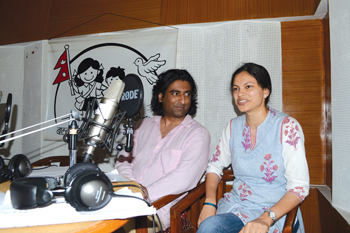Andrew Rajan and Sharmily Rana talk about the craft of storytelling and the future of radio play writing
Playwright and director Andrew Rajan was in Kathmandu recently for a three day radio-writing workshop organised by the British Council to promote budding talents in the Valley. Also speaking at the workshop was 39-year-old Sharmily Rana, winner of last year’s playwriting competition. Nepali Times caught up with the duo to learn about the craft of storytelling and the future of radio play writing.

JUANITA MALAGON
BREAK TIME: Andrew Rajan (left) and Sharmily Rana (right) record Rana's play Life Reflected which won the British Council competition last year.
Andrew Rajan: Because radio is non-visual, it’s a very intimate medium. Listeners get to create their own images in their minds.
Sharmily Rana: I think radio is like a friend, wherever people go they can carry a small set.
With news, information, and music available at the click of a button, how do you see the role of radio today?
Andrew Rajan: Radio is an old art, but it doesn’t mean it’s obsolete. Everyone thought the medium was going to die, but even today BBC gets 40 million listeners every day. Radio will always have an audience.
Sharmily Rana: Nepalis of all ages and from across the country still listen to the radio. My mother-in-law is not tech-savvy, so for her the radio is the ultimate source of information and entertainment. My husband listens to the radio while driving.
What are some of the themes that students seem most interested in during the workshop?
Andrew Rajan: Usually there are a lot of stories about trafficking of young Nepali women to brothels in India. But no matter how good the writing is, they can’t be put on air because BBC has rules that make certain topics out of bound. BBC doesn’t want to broadcast a play about violence or rape at 4pm when children are in the kitchen with their mothers. What works really well on radio, though, is humour. It doesn’t matter how serious the subject is you can always infuse it with humour.
What inspires you to write?
Sharmily Rana: After I got married, I had a lot of free time so I just started to write. Day-to-day experiences and events inspire me.
What is your play about?
Sharmily Rana: My story called Life Reflected revolves around the theme of reincarnation: when the main protagonist looks in the mirror she sees someone else in the reflection. I have tried to explore the lives, experiences, and coming of age of two women.
Nepal has a long tradition of storytelling, how do you think Nepalis can preserve this tradition in the era of digital media?
Andrew Rajan: There is a lingering sense of frustration among Nepalis and lot of people want to pour their grievances through stories.
Unfortunately, there is very little outlet for these stories. That is why it’s important to have regular writing workshops so that different voices have an opportunity to express themselves. With the influx of digital media, more stories from the West will come here, but Nepal’s stories are just as valid and the more Nepalis stick to stories of their own people, the more the outside world will be interested in hearing them.
Storytelling is a great way for Nepalis to introduce their culture to people who are unfamiliar with this place.
Are some societies better at storytelling than others?
Andrew Rajan: I think some of the best stories come from really interesting cultures. This doesn’t mean other cultures are bad at storytelling. It’s just that they haven’t yet grasped the tools with which to tell their stories.
Play to win
Applications for the British Council’s 15 minute Nepali radio play competition are being accepted until 31 July. The winner will get the opportunity to have the play recorded and aired on BBC Nepali Service.
[email protected]
www.britishcouncil.org
(01)4410 798